First day of school – Prima zi de școală
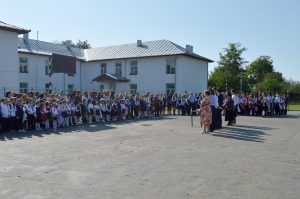 Blessings, good wishes, bouquets of flowers and festive clothes – the first day of school is a celebration day in Romania. But is it like that all around the world? We asked our EVS volunteers to tell us how do they find the first Romanian school day comparing to their experience from home.
Blessings, good wishes, bouquets of flowers and festive clothes – the first day of school is a celebration day in Romania. But is it like that all around the world? We asked our EVS volunteers to tell us how do they find the first Romanian school day comparing to their experience from home.
Urări de bine, binecuvântări, buchete de flori și haine festive – prima zi de școală în România e o zi de celebrări. Dar e la fel peste tot în lume? Noi i-am întrebat pe voluntarii noștri SEV cum li se pare prima zi de școală în România în comparație cu țările lor.
It was really interesting to discover this part of the culture that I’ve never seen before. I was impressed of the involvement of the parents during this first day of school. /…/ In France, it’s totally different. We don’t have a ceremony for the start of the school. (Estelle, France)
A fost foarte interesant să descopăr această parte a culturii pe care nu o mai văzusem. Sunt impresionată de implicarea părinților în această zi. /…/În Franța e complet diferit. Nu avem o ceremonie de început de an școlar. (Estelle, France)
In Croatia for the first day of school we go to buy new books and notebooks for new school year, new pencils, erasers, and other things we need. We go with our parents, mostly moms because dads are always working. We are excited as every kid is for their first day of school, dressed well, but not that fancy as Romanians. (Martina, Croatia)
În Croația pentru prima zi de școală mergem să cumpărăm cărți și caiete pentru noul an școlar, creioane, radiere și alte lucruri de care avem nevoie. Mergem cu părinții, de cele mai multe ori cu mamele, căci tații sunt mereu la muncă. Suntem entuziasmați ca orice copil în prima zi de școală, îmbrăcați frumos, dar nu atât de facy precum românii. (Martina, Croatia)
In Spain, they keep trying to separate the educational system from the politics, religion and Security Forces of the State (although they are connected in not a visible way). They will only attend to some educational event if they are invited – and in this case usually there are protests or riots, especially in Universities – or if they are directly related with the course. (Alba, Spain)
În Spania, se încearcă separarea sistemului educațional de politică, religie și de sistemul de securitate internă (chiar dacă ei sunt conectați într-un mod invizibil). Reprezentanții acestor categorii iau parte doar dacă sunt invitați – iar aceste contexte stârnesc de obicei proteste și revolte, în mod special în Universități – ori dacă au legătură directă cu studiile. (Alba, Spain)
We do not have such a big event as here in Romania. /…/ Children usually cry on the first day and spend only an hour in the classroom, then the teacher or the headmaster makes a little fun for the kids with music, dance or some games. (Roman, Czech Republic)
Nu avem un eveniment așa mare ca în România /…/ Copii plâng de obicei în prima zi și petrec doar o oră în sala de clasă, apoi profesorul ori directorul face ceva distractiv pentru copii, muzică, dans și ceva jocuri. (Roman, Czech Republic)
In Argentina /…/ all the students go to their schools, raise the Argentinian flag for the first time in the year, something we do every day during the school year, and then we all sing the Argentinian anthem. /…/ We bring flowers to the teachers at the end of the school year (and if the teacher deserves it). (Gabriel, Argentina).
În Argentina /…/ toți elevii merg la școală, se ridică steagul argentinian pentru prima dată în acel an școlar, lucru care se va face zilnic după aceea și cântăm cu toții imnul argentinian. /…/ Noi aducem flori profesorilor doar la finalul anului școlar (dacă profesorii le merită). (Gabriel, Argentina)
I wasn’t surprised to see the priest, even though in Italy it would also be weird. Italy is a very catholic country but it is more and more multicultural, especially in the cities, and the relationship between church and state is different from Romania. (Isabella, Italy)
Nu am fost surprinsă să văd preotul, chiar dacă acest lucru ar fi ciudat în Italia. Italia este o țară foarte catolică, dar e din ce în ce mai multiculturală, în orașe în mod special, și relația dintre stat și biserică e diferită de cea din România. (Isabella, Italy)
In comparison to the attended ceremonies, the pupils wear their daily clothes and meet their teacher in the classroom. Together with the teacher the classes go to the schoolyard or the school hall, where the ceremony takes place. Besides this, only the parents of the 1st grade kids are invited. Commonly the people sing a song with movements, which is the beginning of the ceremony. (Stefanie, Lichtenstein)
Prin comparație, elevii poartă hainele de fiecare zi și se întâlnesc cu profesorii în clase. Împreună cu profesorul clasele merg în curtea școlii sau în sala de sport unde are loc ceremonia. Pe lângă asta, doar părinții claselor 1 sunt invitați. De obicei se cântă ceva cântece cu mișcări, ca parte a ceremoniei de început. (Stefanie, Lichtenstein)
I noticed was that everybody had flowers or little bags with them to give as presents for their teachers. In my schools the teachers could only dream about something like this! (Melanie, Belgium)
Am observat că toți aveau flori ori plăsuțe cu cadouri pentru a fi dăruite profesorilor. În școala mea profesorii pot doar să viseze la așa ceva! (Melanie, Belgium)
From all those perspectives, we can understand better our own culture and its’ specifics. Things that seem normal to us, some might be incredible, weird, surprising to others. And that is one of the charms of interculturality that our dear EVS are bringing in the life of Izvoarele.
Urmărind aceste perspective ne putem înțelege mai bine cultura și specificitățile ei. Lucruri care par normale pentru noi, pot fi incredibile, ciudate sau surprinzătoare pentru alții. Și acestea este unul dintre farmecele interculturalității pe care dragii noștri voluntari SEV îl aduc comunității din Izvoarele.
Portret de voluntar – Stefanie (Liechtenstein)
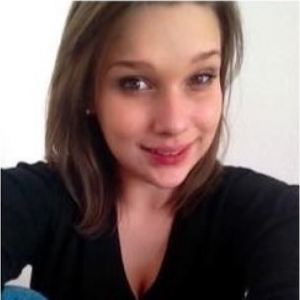 Hi! My name is Stefanie and I am from Liechtenstein. Before coming here to participate in the project, I finished my studies at the college of education in Basel, Switzerland, to become a primary school teacher. Due to this fact, I decided to take a gap-year and go to a foreign country to gain new experiences before I am looking for my first job as a primary school teacher.
Hi! My name is Stefanie and I am from Liechtenstein. Before coming here to participate in the project, I finished my studies at the college of education in Basel, Switzerland, to become a primary school teacher. Due to this fact, I decided to take a gap-year and go to a foreign country to gain new experiences before I am looking for my first job as a primary school teacher.
Salut! Eu sunt Stefanie și sunt din Liechtenstein. Înainte de a lua parte la acest proiect am studiat la coelgiu in Basel, Elveția pentru a deveni profesor în învățământul primar. Din acest motiv am decis să îmi iau un an liber și să plec în altă țară pentru a dobândi o nouă experiență înainte să caut primul loc de muncă ca învățător.
After having read the description of the project, I was totally fascinated because I like the idea of bringing nonformal education and interculturality to young people. I regard it as an exciting and various job where you get in touch with other people.
I am really looking forward to make new experiences and extend my knowledge. On top of it, it would be quite exciting to get to know to new people, a new culture and another country.
După ce am citit descriere proiectului am fost fascinată total, deoarece îmi place ideea de a aduce educația nonformală și interculturală tinerilor. Îmi pare a fi un loc de muncă unde sunt în contact cu o mulțime variată de alți oameni.
Chiar sunt foarte dornică să încerc aceste noi experiențe și să îmi îmbunătățesc cunoștințele. În plus va fi foarte incitant să cunoasc alți oameni, o altă cultură și o altă țară.
Stefanie se află în România pentru o perioadă de 9 luni, din septembrie 2017 până în mai 2018 în cadrul proiectului Volunteer for Rural Communities (ref nr 2017-2-LI01-KA105-000049), proiect co-finanțat de Uniunea Europeană prin Programul Erasmus+ și implementat în România de Asociația Curba de Cultură.
Curba de Cultura in Local Media
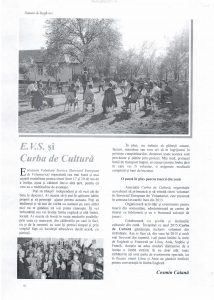 Asociația Curba de Cultură a fondată în 2013 însă oamenilor din spatele ei le-a venit ideea înfințării acesteia și a unui centru de tineret cu mult mai multă vreme în urmă. De patru ani însă Curba de Cultură schimbă lucruri în comunitatea izvorană prin proiectele pe care le implementează, cu ajutorul partenerilor și al finanțatorilor săi.
Asociația Curba de Cultură a fondată în 2013 însă oamenilor din spatele ei le-a venit ideea înfințării acesteia și a unui centru de tineret cu mult mai multă vreme în urmă. De patru ani însă Curba de Cultură schimbă lucruri în comunitatea izvorană prin proiectele pe care le implementează, cu ajutorul partenerilor și al finanțatorilor săi.
Din 2015, pe lângă schimburi de tineri și cursuri de formare, Curba de Cultură găzduiește și voluntari SEV în cadrul proiectelor Erasmus+. Acest lucru a dus la o creștere neașteptată a impactului pe care organizația îl are la nivel local, regional și chiar național.
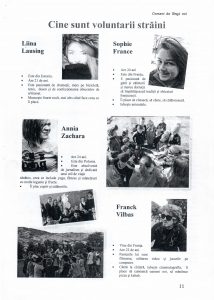 În 2016 colaborarea dintre asociație și școlile locale în diferite activități și evenimente a fost evidențiată și în presa locală și nu o dată. În imagini puteți vedea articole despre SEV, precum și scurte portrete ale voluntarilor găzduiți.
În 2016 colaborarea dintre asociație și școlile locale în diferite activități și evenimente a fost evidențiată și în presa locală și nu o dată. În imagini puteți vedea articole despre SEV, precum și scurte portrete ale voluntarilor găzduiți.
Curba de Cultură was founded în 2013 but the idea behind it is way longer. For four year already Curba de Cultură is changing things in Izvoarele community through its projects and with the help of its partners and its financiers.
From 2015, apart from Youth Exchanges and Training courses, Curba de Cultură started to host EVS volunteers in Erasmus+ projects. This thing led to an unexpected impact increase upon local, regional and even national level, the organization has.
În 2016 the collaboration between association and local schools for different activities and events was underlined by the local media and not just once. In the pictures above you can see articles about EVS as well as short portraits of the hosted volunteers.
The beginning of the school year
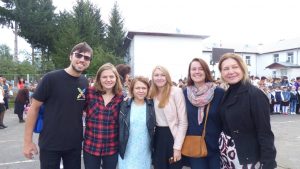 Pentru câteva momente și voluntarii găzduiți de noi s-au simțit din nou elevi, participând la festivitatea de deschidere a anului școalar 2015-2016.
Pentru câteva momente și voluntarii găzduiți de noi s-au simțit din nou elevi, participând la festivitatea de deschidere a anului școalar 2015-2016.
For few moments the vounteers hosted by us felt pupils again, by taking part in the festivities of the Opening of a new School Year.
După participarea la ceremoniile de deschidere a anului școalar la Școala Gimnazială Traian Savulescu în Izvoarele și la Școala Generală din Schiulești, voluntarii au făcut câteva comparații cu ceea ce se întâmplă în țările lor cu aceeași ocazie.
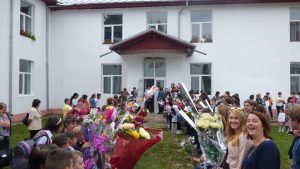 After taking part in the ceremonies in Școala Gimnazială Traian Savulescu in Izvoarele and in Școala Generală in Schiulești, the volunteers made some comparisons with the ceremonies in their countries.
After taking part in the ceremonies in Școala Gimnazială Traian Savulescu in Izvoarele and in Școala Generală in Schiulești, the volunteers made some comparisons with the ceremonies in their countries.
“One difference is the fact that we start school earlier then children in Romania – Polish children start the new school year at 1st September.” (Ania – Poland)
“The main difference between the ceremonies is that in Estonia we don’t see the priest on the first on the first day of school” (Liina – Estonia)
“Guten Morgen they can hear the teacher saying and here it goes – let the next school year begin!” (Hanna – Germany)
“It was similar to what we do in our country, just with a lot more accent put on religion” (Kristijan – Macedonia)
Spor la învățătură!